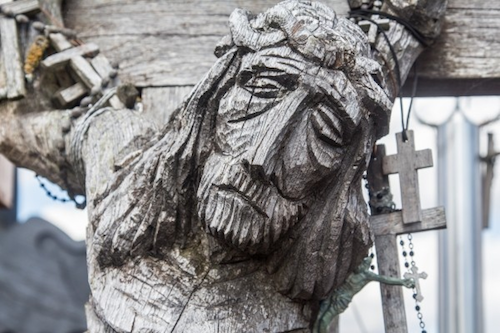We run our website the way we wished the whole internet worked: we provide high quality original content with no ads. We are funded solely by your direct support. Please consider supporting this project.

Do the Gospels Fabricate Prophetic Fulfillment?
Skeptically-inclined scholars, and especially critics of Christianity, frequently argue that the Gospel authors created mythological portraits of Jesus largely on the basis of OT material they claim Jesus “fulfilled.” In other words, they surveyed the OT and fabricated stories about how Jesus fulfilled those prophecies. In response, it’s hard to deny that there are certain narratives in which it seems Gospel authors may in fact be doing this. In the previous post, I discussed how Matthew apparently revised some of the details about Jesus’ entrance into Jerusalem to make it conform to the Septuagint. This is a classic case in point. It seems we must thus grant that the conviction held by the NT writers that everything in the OT must find its fulfillment in Christ sometimes motivated these authors to rework details of the Jesus story to conform to OT material.
Having granted this much, I must add that, as a general explanation of how the Gospel writers developed the portrait of Jesus, the fabrication theory faces massive problems. Beyond the many considerations that support the general historical reliability of these documents, (See Lord or Legend) if the Gospel authors were fabricating portraits of Jesus on the basis of OT material, wouldn’t they have constructed a portrait that conformed to this material much more literally? If the Jesus of the Gospels is created from the OT texts he fulfills, in other words, why does he fulfill some of these texts so awkwardly?
Let me illustrate. Consider John’s interpretation of the guards’ response to Jesus’ request for something to drink while hanging on the cross. They placed a sponge dipped in “wine vinegar” on “a stalk of the hyssop plant, and lifted it to Jesus’ lips.” This, John says, was done “so that Scripture would be fulfilled” (Jn. 19:28-29). The passage these guards “fulfilled” was Psalm 69:21 in which the Psalmist complains that his enemies “give me poison (ro’sh) for food” and “offer me sour wine for my thirst” (NLT). Now, if anyone is inclined to think that Jesus had to ask for something to drink and that the guards had to respond the way they did in order to “fulfill” this verse, as conservative Christians apologists frequently do, they’d have to explain how it is that the second half of this passage had to be fulfilled while the first half did not, for we have no account of anyone trying to poison Jesus.
If the Jesus of John’s Gospel is fabricated by John from OT material, why would he fabricate a narrative that depicts Jesus being offered sour wine to fulfill the second half of Psalms 69:21 but that lacks anyone trying to poison Jesus to fulfill the first half of this passage? In reality, there is nothing predictive about this passage, and so neither Jesus nor the guards had to act the way they did. What is going on instead is that John is interpreting the OT in an intensely Christocentric way. He is convinced that Jesus brings God’s dealings with Israel throughout the OT to a climatic fulfillment, and so any aspect of Jesus’ life that in any way has a parallel in the OT is seized as a “fulfillment” of that parallel. Even so, we must admit that it’s rather awkward. The fact that John could site the second half of a verse while ignoring the first half simply reveals just how intensely he and other early followers of Jesus combed through the OT to find confirmations of their Christocentric conviction.
The very fact that the Jesus portrayed in the four Gospels often fulfills OT passages so awkwardly strikes me as strong evidence that they were not creating a portrait of Jesus on the basis of these passages but are rather striving to find new meaning in these OT passages on the basis of a historical Jesus. If John believed that Jesus actually asked for something to drink and was offered sour wine, for example, I can understand why he would infuse the second half of Psalm 69:21 with Christological significance while ignoring the first half. But his selective use of this and many other passages makes no sense on the supposition that he was fabricating a portrait of Jesus on the basis of this and other passages.
In any event, the most significant point to note concerning the often-awkward way the Gospel authors weave OT passages and themes into their various portraits of Christ is that it reflects a remarkably intense Christocentric interpretation where the passages’ meaning was acquired in the light of Christ.
Photo via Visual Hunt
Category: General
Tags: Cross, Cruciform Theology, Jesus, Old Testament, Prophesy
Topics: Biblical Interpretation, Christology
Related Reading

Video Q&A: Do you think Jehovah’s Witnesses and Mormons are saved?
Does Greg believe that everyone goes to Heaven regardless of their beliefs? Find out here.

The Cruciform Beauty of Horrific Divine Portraits
“Only a person who is aware of the crucified Christ can properly understand Scripture.” Luther (Table Talks) In the last three posts I’ve been wrestling with how insights from Matthew Bate’s book, The Hermeneutics of the Apostolic Proclamation might help us interpret violent portraits of God in the OT in a way that discloses how…

Podcast: What is Crucifixion of the Warrior God?
In this 100th episode Greg gives us a peek at Crucifixion of the Warrior God. Pre-order your copy of the book here: The Crucifixion of the Warrior God: Volumes 1 & 2 (Fortress Press, 2017) http://traffic.libsyn.com/askgregboyd/Episode_0100.mp3

Does God Have a Dark Side?
In the previous post, I argued that we ought to allow the incarnate and crucified Christ to redefine God for us rather than assume we know God ahead of time and then attempt to superimpose this understanding of God onto Christ. When we do this, I’ve argued, we arrive at the understanding that the essence…

Part 4: An Alternative Cross-Centered Approach
Image by Karl Pang via Flickr As I mentioned in Part II of this review, I am deeply appreciative of the fact that Flood grasps the centrality of enemy-loving non-violence in Jesus’ revelation of God. And while many, if not most, of the depictions of Yahweh in the Old Testament are consistent with this revelation, I…

Typhoon Haiyan and “Natural” Evil
Greg recorded his thoughts a few days ago on Typhoon Haiyan and the reality of “natural” evil that’s not really natural at all. “This an enemy has done.” (Matthew 13:28)
